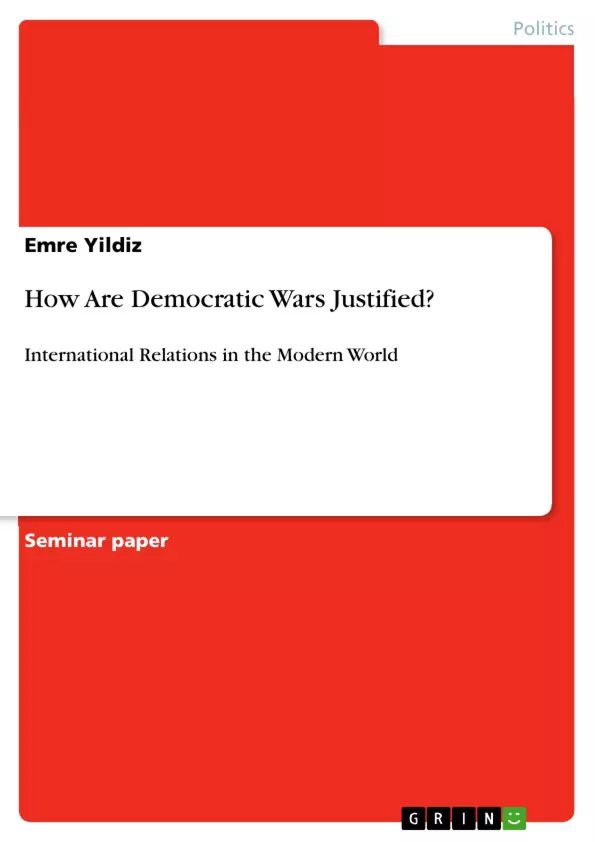In this paper, I will illustrate how wars conducted by democracies are justified. I chose this topic because democracy, at least in the Western world, has been seen as a preferential and desirable constitution because of its association with peace and cooperation. The Democratic Peace Theory certainly bolsters this viewpoint, but still, we notice as we look at empirical data that democracies are not peaceful at all. This is a noteworthy gap in this theory. Through answering my central question, I want to explain this gap and also how democracies cleverly elude the constraints imposed on them to go to war, which one would not expect of them. Additionally, through outlining the justifications, I want to help understand why democracies are belligerent.
I will first refer to the problem of definition, for democracy and war are not clear-cut terms in political science and outline how I understand democracy and war in this paper. In the second section, I will provide the theoretical ground, the Democratic Peace Theory which I will refute through empirical evidence, after which five arguments of justification will follow: First, humanitarian intervention and the role of the media, second, moral duties, third, the construction of images of the ‘other’ and fourth, wars within democratizing states. Lastly, in the conclusion, I will summarize the arguments, briefly refer to their discrepancies and provide suggestions for further research.
In each of the arguments, I will present what it is, how the justification comes about and add an example to illustrate it. In the first three arguments, I will also show how approaches used to explain the peacefulness of democracies are being reversed. As well, I will provide some definitions of a few major terms used in the arguments to establish clarity. Because justifications should not always be considered true, I will provide critical points for each argument incorporated in the respective section. Those are also summarized in the conclusion.
Inhaltsverzeichnis (Table of Contents)
- Introduction
- The problem of definition
- The Democratic Peace Theory
- Empirical evidence for the belligerence of democracies
- Justificatory arguments for democratic wars
- Humanitarian intervention and the role of the media
- Moral duties
- The construction of images of the 'Other'
- Wars of democratizing states
- Conclusion
Zielsetzung und Themenschwerpunkte (Objectives and Key Themes)
The paper aims to explore the justification of wars conducted by democracies. It examines why, despite the perception of democracies as peaceful actors, they engage in violent conflict. The author seeks to understand the discrepancies between the Democratic Peace Theory and empirical evidence, highlighting the strategies used by democracies to legitimize their actions.
- The Democratic Peace Theory and its limitations
- Empirical evidence of democratic belligerence
- Justifications for democratic wars
- The role of media and the construction of narratives
- The influence of moral duties and 'othering' on justifications
Zusammenfassung der Kapitel (Chapter Summaries)
- Introduction: The paper sets out the central question of how democratic wars are justified, highlighting the discrepancy between the Democratic Peace Theory and empirical evidence of democratic involvement in wars.
- The problem of definition: The author clarifies the definitions of war and democracy, acknowledging the complexities and ambiguities surrounding these terms in political science.
- The Democratic Peace Theory: The chapter presents the Democratic Peace Theory, which argues that democracies are inherently peaceful actors, particularly towards one another. It also foreshadows the refutation of this theory using empirical data.
- Empirical evidence for the belligerence of democracies: This section provides numerous examples of historical and contemporary conflicts involving democracies, demonstrating their active participation in wars and military interventions. The author discusses various types of conflict, including post-colonial wars, world wars, proxy wars, and interventions in countries such as Kosovo, Afghanistan, Iraq, and Libya.
- Justificatory arguments for democratic wars: This chapter introduces the primary justifications used by democracies to legitimize their wars, focusing on humanitarian intervention and the role of the media.
- Humanitarian intervention and the role of the media: The author explores the concept of humanitarian intervention, arguing that it often serves as a justification for military intervention, particularly in cases of human rights violations. The role of media in constructing narratives and shaping public opinion is also discussed.
Schlüsselwörter (Keywords)
This paper focuses on the intersection of democracy, war, and justifications for armed conflict. Key themes include the Democratic Peace Theory, empirical evidence of democratic belligerence, humanitarian intervention, media influence, moral duties, and the construction of "the other". The paper explores these concepts to understand how democracies legitimize their involvement in war, despite the perception of their peaceful nature.
Frequently Asked Questions
What is the Democratic Peace Theory?
It is the theory that democracies are inherently more peaceful and rarely, if ever, go to war with one another.
How do democracies justify going to war?
Common justifications include humanitarian intervention, moral duties to protect human rights, and the construction of an "other" who is perceived as a threat.
What role does the media play in democratic war justifications?
Media can shape public opinion by highlighting human rights violations, thereby creating public support for military interventions on humanitarian grounds.
Are democracies truly more peaceful than other states?
Empirical data suggests otherwise; democracies frequently participate in wars, world conflicts, and military interventions despite their peaceful image.
What is meant by the "construction of the Other"?
It involves depicting the enemy as undemocratic, barbaric, or fundamentally different, which helps legitimize military action against them in the eyes of the public.
- Citar trabajo
- Emre Yildiz (Autor), 2012, How Are Democratic Wars Justified?, Múnich, GRIN Verlag, https://www.grin.com/document/232023



